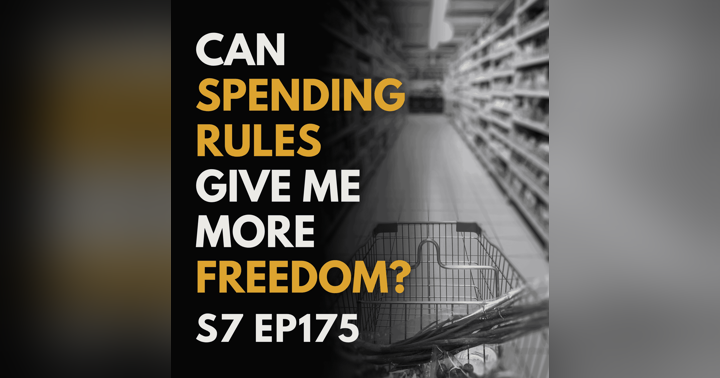How Do I Live in Financial Peace and Keep Stress from Coming Back?
You’ve built a budget, you’re tracking your numbers, but some categories still leave you feeling out of control. In this episode, Ralph explores why setting personal spending rules might be the missing piece in your plan. Rather than feeling restrictive, these boundaries help reduce impulse spending and align your money with your values. If you’re tired of feeling out of control with your spending, it’s time to discover the freedom that comes from setting spending rules.
Check out the full podcast episode here
You’ll learn how to spot your financial pressure points, set clear rules for those tricky categories, and pray through each decision. Ralph shows how just one well-placed spending rule can offer more freedom, less stress, and a better handle on the habits that matter most.
Chapters:
- 00:11 - Gaining Control Over Spending
- 01:08 - Understanding Personal Spending Habits
- 04:54 - Creating Personal Spending Rules
- 07:05 - Creating Effective Spending Rules
- 09:12 - Embracing Personal Rules for Financial Freedom
- 10:15 - Introducing the Concept of Giving and Financial Stress Relief
Takeaways:
- Intentional boundaries are essential for financial health, guiding your spending towards your values.
- Identify one or two spending areas where you struggle and set simple rules for them.
- Writing down your spending rules and keeping them visible can help you stick to your budget.
- Praying for self-control and guidance can empower you to overcome financial stress and impulsive spending.
Links referenced:
financiallyconfidentchristian.com/master
💛 Join the Financially Confident Christian Community
If today’s episode encouraged you, we’d love to invite you to be part of something bigger — the Financially Confident Christian Community.
This is where faith and finances come together — a growing family of believers supporting one another, sharing encouragement, and helping spread God’s truth about money.
Your membership helps keep the show free for everyone while funding new devotionals, study guides, and outreach resources.
👉 Learn more and join the mission at financiallyconfidentchristian.com/join
Together, we’re helping believers everywhere break the cycle of financial shame and live with confidence in Christ. 🙏
Get Ralph's Book on becoming a Financially Confident Christian financiallyconfidentchristian.com/becoming
WATCH NOW ON YOUTUBE (OUR VIDEO VERSION)
WATCH NOW ON RUMBLE (OUR VIDEO VERSION)
Please share our Podcast with all your friends and family!
Submit your questions or ideas for future shows - email us at
ralph@askralph.com or leave a voicemail message on our podcast page
Mentioned in this episode:
Post roll for Book Becoming
Thank you for listening to the Ask Ralph podcast. We encourage you to follow us on our social media pages and rate our show. For more information about the topics discussed on the podcast visit Saggio Accounting+PLUS.
00:00 - Untitled
00:27 - Untitled
00:39 - Gaining Control Over Spending
01:36 - Understanding Personal Spending Habits
05:22 - Creating Personal Spending Rules
07:33 - Creating Effective Spending Rules
09:39 - Embracing Personal Rules for Financial Freedom
10:42 - Introducing the Concept of Giving and Financial Stress Relief
You've got a budget.
Speaker:You're tracking your expenses, you know where your money should go, but spending
Speaker:for you still feels chaotic sometimes.
Speaker:Like money slips right through your fingers.
Speaker:What if setting clear rules around spending isn't just restrictive?
Speaker:Brings you more control and more importantly, brings you more peace.
Speaker:I'm gonna show you how to do that on today's show.
Speaker:Welcome back.
Speaker:I'm Ralph, and it's great to be with you here again as we
Speaker:answer our one key question.
Speaker:That is, how can I become a financially confident Christian?
Speaker:And today we continue our series dealing with the stress of money
Speaker:worries, and we just got past a couple days talking about home ownership.
Speaker:And we've talked in this series about budgeting and we've talked
Speaker:about savings and we've talked about tackling debt, managing credit.
Speaker:And if you're following along, you're doing great.
Speaker:You're, you're telling your money exactly where it needs to go.
Speaker:Today we're gonna take it even a step further.
Speaker:Yes, there is a step further that we can go.
Speaker:And we're gonna focus on your spending habits that cause you stress, those
Speaker:things that will cause you stress if you don't keep them in check.
Speaker:And today I'm gonna talk about building some personal spending rules.
Speaker:These spending rules are gonna help you support your budget, and they're
Speaker:gonna bring freedom within your plan.
Speaker:So let's ask the pertinent question for today, and that is,
Speaker:how can setting personal spending rules give me more freedom?
Speaker:And best of all, give me less stress.
Speaker:See, here's the truth.
Speaker:Even with a budget, if you're like me and like most other people,
Speaker:you're listening right now, you're like, Ralph, yeah, that's great.
Speaker:But some spending categories, Ralph, they just feel hard to manage.
Speaker:I know for me, sometimes it's eaten out, dying out 'cause it becomes complicated.
Speaker:Or maybe for you it's that impulse buying or those entertainment expenses.
Speaker:Hey, everybody deserves to get some entertainment and you've done a good
Speaker:job of budgeting for all them, but you still just happen to go over them
Speaker:and you beat yourself up about it.
Speaker:It leads to frustration.
Speaker:You're frustrated like, I put this number down Ralph, but I
Speaker:just can't seem to stick to it.
Speaker:And then you feel guilty about it.
Speaker:You, you, you budgeted.
Speaker:You put the numbers on the paper and you've went over your budget and now
Speaker:you feel frustrated, you feel guilty.
Speaker:And what does all that dings do?
Speaker:All those things just build more stress and honestly, you look at it, you feel
Speaker:like your money is just vanishing away in these areas and see when your money
Speaker:vans away, it makes it harder to save it.
Speaker:It's hard to save if you don't have any excess or or margin.
Speaker:I've talked about it on the show many times.
Speaker:It's harder to pay off debt when you don't have that margin, when you're not really
Speaker:laser focusing on where your money goes.
Speaker:And the big, big picture is it's hard to stay in financial control
Speaker:if you're letting those budget areas just slip away from you.
Speaker:Because here's the thing, you've got to understand.
Speaker:If you're not intentional with your spending, that unintentional spending
Speaker:just means that money just happens to you.
Speaker:Hear me on that.
Speaker:Money just happens to you, and when it just happens to you, It
Speaker:usually means that it doesn't align with your values or your goals.
Speaker:So you might be sitting there going, Ralph, how do I get past this?
Speaker:Well, honestly, I think the best way to do it is put together some
Speaker:personal spending rules, because then you have what I'll call intentional
Speaker:boundaries and those intentional boundaries protect your priorities.
Speaker:Just the other night I gave a talk to my softball friends with the guys that
Speaker:play on the softball team with me.
Speaker:We were talking about the book of Galatians, chapter five, verses 22 and
Speaker:23, and I don't have time to cover it right now, but I want you to read it
Speaker:because it talks about self-control being a fruit of the spirit, and
Speaker:that's really what I'm talking about.
Speaker:These personal spending rules are really intentional boundaries
Speaker:that protect your priorities.
Speaker:Look at the book of Proverbs, chapter four, verse 23.
Speaker:It says this Above all else.
Speaker:Above all else, guard your heart.
Speaker:Everything you do flows from it above all else, guard your heart for
Speaker:everything you do, flows from it.
Speaker:What does that mean?
Speaker:That means that Your spending flows from your heart.
Speaker:You're spending flows from your habits.
Speaker:And if you can create some guides to help guide that flow towards peace and
Speaker:towards wise stewardship, it's kinda like an athlete training for victory.
Speaker:We're training for victory.
Speaker:Look at one Corinthians chapter nine, verse 25.
Speaker:It calls us to be disciplined for a greater prize.
Speaker:So now you're asking Ralph, what do we do?
Speaker:Well, here's what you do.
Speaker:My my humble opinion is this.
Speaker:You gotta move from unintentional to intentional spending with one simple step.
Speaker:I want you to just identify one or two spending areas where you lack control.
Speaker:You're looking at those numbers, you're like, Ralph, I've got the budget,
Speaker:but man, every time I look at my budget, I'm always way over on those.
Speaker:I get it.
Speaker:I've been there.
Speaker:I, the same thing happens to me, and this is what I do for a living, but this is
Speaker:the place where you create those clear personal spending rules for those areas.
Speaker:Now, here's the thing I want you to understand.
Speaker:You're in complete control here.
Speaker:These are boundaries that are made by you.
Speaker:They're made for you, and they're simply tools that help you stick to your plan.
Speaker:So here's your one action step for today.
Speaker:This is a some practical steps to help you get to that point.
Speaker:The first step is to identify those leaky areas.
Speaker:You gotta look through your spending data.
Speaker:Ask yourself these questions.
Speaker:Where does money disappear?
Speaker:You know, what are those areas where I'm always over budget?
Speaker:You know, where do you overspend or do you act impulsively,
Speaker:because that's part of it too.
Speaker:If you're acting impulsively, that's when you gotta look at.
Speaker:So once you've done that, choose one or two categories.
Speaker:Maybe for you it's, it's dining out of that, online shopping, or
Speaker:maybe just impulsive shopping.
Speaker:So once you've identified one or two of those, the second step
Speaker:is to create just a simple rule.
Speaker:Just one per category.
Speaker:Make it easy to remember and make it easy to apply, because if you
Speaker:make it easy, you're gonna do it.
Speaker:As an example, here's a great rule.
Speaker:If you struggle with eating out, set a rule that, oh, I'm only
Speaker:going to eat out once a week.
Speaker:That doesn't mean all three meals once a week.
Speaker:That just means just once a week.
Speaker:Now, maybe for you, it's that impulsive buying, and I've
Speaker:talked repeatedly about this.
Speaker:So for you, maybe you put in that pause, that wait 24 hours or 48
Speaker:hours even before you, before you buy any online purchase, over $25.
Speaker:Again, you set the number.
Speaker:You set the rule because it's your rule to live by.
Speaker:Or maybe for you, it's that coffee habit.
Speaker:Now I'm gonna pick on coffee shops again, but maybe say, look, I'm
Speaker:only gonna do that twice a week.
Speaker:Maybe for you it's that grocery trip and you say, look, here's
Speaker:what I'm gonna do, Ralph.
Speaker:Here's my rule for myself.
Speaker:I'm only gonna buy what's on my list.
Speaker:So you figured out those categories.
Speaker:You came up with the rules.
Speaker:The third step is the crucial step, and that's write it down, put
Speaker:it somewhere where it's visible.
Speaker:Maybe you put it in your wallet.
Speaker:I've seen people take a piece of paper and wrap it around their credit card.
Speaker:So before they use the credit card, they go and see, does this pass my rules?
Speaker:Maybe you put it as a phone screen or maybe use a budgeting app, or maybe it's
Speaker:the online shopping, it's bothering you.
Speaker:See, take some sticky notes and stick 'em right to the front of
Speaker:your computer or onto your laptop.
Speaker:I just wanna remind you of one more thing.
Speaker:You're not alone on this journey.
Speaker:So the last stage, step four of this is to pray for strength.
Speaker:We have a loving God that wants to help us, so ask God for self-control.
Speaker:Lord, just help me get past these obstacles.
Speaker:Help me adhere to these rules that I've created.
Speaker:It's a great time to ask Lord for clarity.
Speaker:Lord, show me how I can do this better.
Speaker:How can I make better decisions?
Speaker:Then finally, ask the Lord to help you with that commitment
Speaker:to follow your rules this week.
Speaker:And now you're probably asking Rob, okay, that sounds good, but how does this work?
Speaker:Why does it work?
Speaker:Well, here's why it works, because it creates boundaries that
Speaker:replace those vague intentions.
Speaker:Again, it creates intentionality.
Speaker:If you don't have intentionality, things are gonna go haywire.
Speaker:But if you have intentionality.
Speaker:It's going to help because it helps you say no to those impulse buys.
Speaker:pre-deciding.
Speaker:Was this in my rule book?
Speaker:And all of that leads to reduced stress and supporting the progress that you're
Speaker:making to reinforce your budget and reinforce your values and your goals.
Speaker:Let's pray about this together.
Speaker:Father God, we just thank you for giving us the fruit of the
Speaker:spirit, including self-control.
Speaker:And Lord, we confess that we often struggle with impulse spending
Speaker:or any of the other things that we've talked about today.
Speaker:And Lord, we ask that you would grant us wisdom to identify our weak spots.
Speaker:Help us create clear and simple rules that reflect our values, Lord, and strengthen
Speaker:us, because we're gonna need it.
Speaker:Lord, strengthen us to stick to these rules that we've created and guide our
Speaker:habits to bring peace and to reflect your wisdom, Lord, your perfect wisdom.
Speaker:And we ask this with confidence.
Speaker:In Jesus' name,
Speaker:Amen.
Speaker:So my big takeaway today, my friend, is to embrace personal rules, not as a
Speaker:restriction, but as a tool for freedom.
Speaker:These really are tools for freedom because they can give you control over your money.
Speaker:They can help you align your spending with your values.
Speaker:And I'm gonna encourage you today, start with just one rule.
Speaker:You don't have to have this big, long rule book.
Speaker:Look at those big, pressure points for you and just implement one rule.
Speaker:Because listen, you're making real progress and taking one step at a time.
Speaker:That's how confidence is built.
Speaker:And I'm just gonna encourage you, if today's show helped you, do me a
Speaker:huge favor and share it with other people, share it with someone else
Speaker:who needs to hear this message.
Speaker:You can also visit financially confident christian.com for more resources
Speaker:And again, for the first a hundred listeners that go to financially
Speaker:confident christian.com/master, I'm gonna give you a free copy of my book.
Speaker:You can also tell your friends about it.
Speaker:It's called Mastering Your Finances.
Speaker:It's a short read, but it will be impactful to you.
Speaker:Now, tomorrow we're gonna talk about something that is contradictory.
Speaker:Ready for this one?
Speaker:It's this question, how can giving actually reduce my money?
Speaker:Stress?
Speaker:Yes, I'm gonna share some beautiful things tomorrow on the show.
Speaker:You don't wanna miss it, so I just wanna encourage you now.
Speaker:Stay strong, let's go out there and be let.
Speaker:Financially confident Christians, I believe in you.
Speaker:Believe in yourself.
Speaker:God bless you, and you have a great day today.














